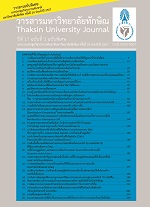Properties of Charcoal from Areca Catechu Linn Shells.
Main Article Content
Abstract
This work presents a process to produce charcoal from Areca Catechu Linn (betel nut) shells, which are household wastes, for development of biomass energy. The produced charcoal from betel nut shells is black and lightweight and it has the productivity of 18.94 ± 0.21%. Results show that moisture content, flammable substance and ash rate are 5.524%, 78.112% and 16.364%, respectively. The combustible elements of charcoal consist of 68.45% of carbon, 68.45% of oxygen, 16.79% of hydrogen, 3.75% of nitrogen and 0.13% of sulfur. Due to the charcoal from betel nut shells has lightweight and high burn rate, so it was molded into briquette for measuring the fuel consumption rate and heating rate. All briquettes tested were 0.37 ± 0.04 kg/hr and 3.35 ± 1.49 °C/min for the fuel consumption rate and heating rate, respectively. The heating value is 6,091.45 cal/g, satisfying the Thai Community Standard Product (238/2547) specified at 5,000 cal/g. It was found that the ultimate analysis and thermal properties of the produced betel nut shell charcoal are comparable to the mangosteen charcoal and commercial rubber wood charcoal. Thus the betel nutshells can be used as a biomass energy source to produce the charcoal in order to reduce the usages of firewood and charcoal derived directly from natural forest.


